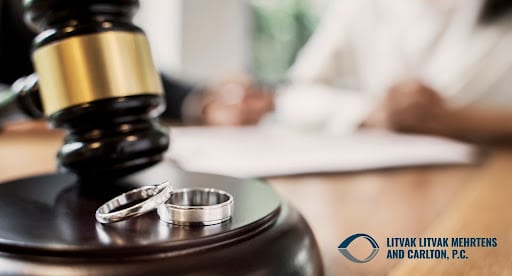Common Law Marriage Colorado
Colorado Common Law Marriage & Divorce

Did you know that the Colorado Supreme Court recognizes some couples as married, even if they don’t have a marriage license or a ceremony? This is called common law marriage, and Colorado is one of the few states that still recognizes this type of union. But what happens when common-law spouses want to divorce? Do they have the same legal rights as other married couples after divorce? Colorado divorce attorneys at Litvak Litvak Mehrtens and Carlton can answer these questions and more. For more information on how we can help you with all your divorce needs, call 303-951-4506 today.
What is Common Law Marriage?
A common law marriage (also called an informal marriage) is the same as a traditional marriage in the eyes of your friends and family. Still, it doesn’t involve a marriage ceremony or a license. In other words, common law marriage is a non-ceremonial, unofficial marriage. Although this kind of marriage is different than a ceremonial marriage, it’s just as valid and binding. Common law married couples have the same rights as those involved in formal marriages.
Common Law Marriage Requirements
Most states have at least specific requirements to enter into a valid common law marriage, including:
- Cohabitation, or living together, for a specific period of time.
- Mutual consent or a mutual agreement from both parties
- Both partners must be at least 18 years old, mentally stable, and not married to anyone else.
- Both partners must have full intentions of being a married couple with an intimate relationship.
- Each spouse must act like a married couple to their family and friends by sharing the same last name, referring to each other as a spouse, wearing rings, and having joint credit cards or a joint bank account.
Is Colorado a Common Law Marriage State?
Yes, common law marriage exists in Colorado. But Colorado law only recognizes common-law marriages that occurred on or after September 1, 2006. Only a handful of states recognize common law marriage, including:
- Iowa
- Kansas
- Montana
- Rhode Island
- South Carolina
- Texas
- Utah
- District of Columbia
A handful of other states recognize common-law marriages as well, but only if they occurred before a specific date.
- Pennsylvania, if the common law marriage occurred before January 1, 2005
- Ohio, if the common law marriage occurred before October 10, 1991
- Oklahoma, if the common law marriage occurred before November 1, 1998
- New Hampshire, but only if the common law relationship exists for inheritance purposes
- Idaho, if the common law marriage occurred before January 1, 1996
- Georgia, if the common law marriage occurred before January 1, 1997
Marriages That are Banned in Colorado
There are only two types of marriages that Colorado law bans, and those are:
- Bigamous marriages, which means that one party was already married when they married someone else
- Incestuous marriages, which means that someone married one of their family members.
If the state finds a marital relationship to be illegal, one or both parties can still be referred to as a putative spouse. A putative spouse is one that cohabitated with their spouse under the belief that they were truly married. For example, maybe one spouse entered into a marriage not knowing that the other spouse was married until years down the line. Putative spouses have the same legal rights as regular divorced people in that they can receive spousal support and property.
See Also: How Is Property Divided in a Divorce in Colorado?
Documents Needed to Establish Common Law Marriage
Similarly to regular spouses, common law spouses need to provide and sign several documents to prove that the common law marriage exists. Listed below are the documents that most states require for a recognized common law marriage.
- An affidavit that explains all marriage history, including details of the current common law marriage and all details of pre-existing marriages.
- Affidavits from friends and family that explain that the common law marriage exists, whether or not they consider the spouses as common law married, when the marital relationship began, how the marriage was announced publicly, and how long the spouses have lived together.
- Documents that show joint ownership of property by a common law couple
- Proof of joint bank accounts and credit card accounts, including checks and bank statements.
- Health insurance policies that name the other common law spouse as a beneficiary.
- Birth certificates and school records if common law couples share children together.
- Any documents that prove that the common law spouses have joint financial obligations, including mortgages, loans, etc.
- Mail that’s addressed to the common law married couple.
- Documents that suggest a legal name change so that each spouse shares the same last name.
- Records from the couple’s church that suggest their membership, their child’s baptism, Sunday school attendance, etc.
- Joint tax returns
Can You Formalize a Common Law Marriage?
Common law marriages can’t really be formalized. If you wanted to “formalize” the marriage, you would have to create a formal marriage with a marriage certificate or a marriage license. If you want to create specific documentation that your common law marriage exists in Colorado, you can fill out this form, which is just an affidavit.
Can Same-Sex Couples Enter Into a Common Law Marriage in Colorado?
Yes, a same-sex couple can become common law married in Colorado just like a heterosexual couple. Since the summer of 2015 in which Obergefell v Hodges federally legalized same-sex marriage, these couples have maintained all the same rights as heterosexual couples.
See Also: Same Sex Divorce Lawyers
Does Common Law Divorce Exist?

Technically, there is no such thing as common law divorce. All married couples, common law or not, have to go through the same legal divorce process. This means that a common-law couple who divorces will have the same rights to alimony in Colorado, child support, child custody, division of marital property, etc. An experienced Colorado family law attorney at Litvak Litvak Mehrtens and Carlton can guide common law divorced couples through the formal divorce process while helping them agree on spousal and child support.
Call Litvak Litvak Mehrtens & Carlton Today
Because common-law marriages are just as valid as those with a ceremony and a marriage license, that means common law divorce is just as valid too. Our family law firm handles divorce from all kinds of marriages every day. For more information on how divorce attorneys at Litvak Litvak Mehrtens and Carlton can help you, call 303-951-4506 today.
